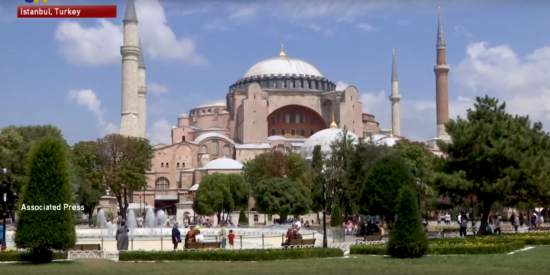Investigative journalists from the Associated Press have uncovered an operation by the Fancy Bear hacking group to gather information about important figures within Orthodox Christianity. This includes personal aides to the Ecumenical Patriarch Bartholomew, the head of the Orthodox Church based in his ancient seat in Istanbul.
Cybersecurity experts believe that Fancy Bear is directly linked to the GRU, or Russian military intelligence. It has been connected to some of the largest cyber-attacks of the last few years.
The reason for the attack is largely believed to be connected with the future elevation of the Kyiv Patriarchate of the Ukrainian Orthodox Church to a position of independence and co-equality with Russian Orthodoxy.
“We contacted the Ecumenical Orthodox church and we presented our findings to them. They wouldn’t speak to us on the record, they are now right in the middle of very sensitive negotiations over the future of the Ukrainian Orthodox church, so they wouldn’t speak to us. But I did speak to a couple of church officials off the record and they say that their number one suspect for this hacking is the Russian government,” investigative journalist Raphael Satter said.
If the Ecumenical Patriarchate grants autocephaly, or self-governance, to the Ukrainian Church, it will strike a massive blow to Russian claims of cultural dominance over Ukraine and the Kremlin’s grip over religious authorities in Ukraine.
The Moscow Patriarchate in Ukraine is often looked as operating in the interests of the Russian government, as opposed to the more independence-minded Kyiv Patriarchate.
“Since our (Russian) church leaders are connected to the FSB and their epaulets stick out from under their habits, they deal with the same tasks that the foreign intelligence service deals with, roughly speaking. They provide Vladimir Putin’s policy with an ideological foundation. Ukrainians understand this perfectly well and consider this version (of Orthodoxy) as a tool of influence by an enemy state,” political analyst Dmitry Oreshkin said.
Cyril Hovorun, a Ukrainian church leader that was found to be one the targets of the hacker group, goes on to point out that if the Ukrainian Church were to be granted Autocephaly, it would also undermine Russian claims to being the protector of Orthodoxy in the eyes of foreign churches. This is a pillar of Russian foreign policy in the Balkans.
“Nowadays the rationale, the main reason why hacking groups would, say, intrude into the accounts of Patriarch Bartholemew, his advisers, to the accounts of different church leaders in other churches, is primarily Ukraine – because the Ukrainian church is on its way towards independence. This is a major political concern for Russia, and many other churches are involved in this situation because at a later stage the recognition of the Ukrainian church by other churches will be important,” Orthodox theologian Cyril Hovorun said.
Cyberwarfare and control over Orthodoxy have both been fundamental elements of Russia’s hybrid war against Ukraine. In the delicate negotiations that are leading up to Ukrainian religious independence from Moscow, the slightest misstep can lead to a diplomatic disaster. Russian hackers appear to be taking steps to undermine Ukraine’s bid for ecclesiastic independence.













